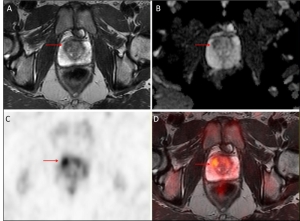by
Lauren Dubinsky, Senior Reporter | July 19, 2016
Ever since the introduction of PET/MR, the industry has been trying to determine the indications it's the most useful for. University of Michigan researchers recently uncovered that combining PET imaging with multi-parametric MR (mpMR) improves the accuracy of image-guided prostate biopsies.
Prostate cancer is usually multi-focal and involves multiple lesions with varying degrees of risk. Because of that it's imperative that lesions with the greatest potential for becoming malignant be identified.
In the future, the researchers believe PET/MR may become a "one-top imaging test" for men with suspected yet undetected prostate cancer or for men undergoing surveillance for known low-risk prostate cancer.



Ad Statistics
Times Displayed: 172805
Times Visited: 3130 For those who need to move fast and expand clinical capabilities -- and would love new equipment -- the uCT 550 Advance offers a new fully configured 80-slice CT in up to 2 weeks with routine maintenance and parts and Software Upgrades for Life™ included.
In an ongoing clinical trial, they studied 36 men with rising prostate-specific antigen (PSA) levels. They evaluated the value of fusion F-18-choline PET/MR for image-guided prostate biopsies to detect significant prostate cancer compared to standard biopsies.
The biopsies were performed after real-time transrectal ultrasound (TRUS). The histological results were determined by standard and targeted biopsy core as well as prostatectomy specimens.
The researchers found that 15 of the patients had significant prostate cancer and 12 were identified with targeted biopsies and five were detected with standard biopsies.
They concluded that fusion PET/MRI-TRUS image registration for targeted prostate biopsies is "clinically feasible and accurate" and that combining F-18-choline PET to mpMR improves the identification of significant prostate cancer.
“The use of advanced imaging to inform placement of biopsy needles promises to greatly minimize the uncertainty associated with prostate cancer care," Dr. Morand Piert, professor of radiology in the division of nuclear medicine at the university, said in a statement. "Imaging may one day be performed prior to biopsy and, if negative, no biopsy would be needed."
In order for that to happen, advanced imaging has to have a superior negative predictive value that might not be achieved with mpMR alone. Even though F-18-choline PET is used for this trial, Piert believes that other radiotracers that are specifically geared toward prostate cancer might hold even more potential.

